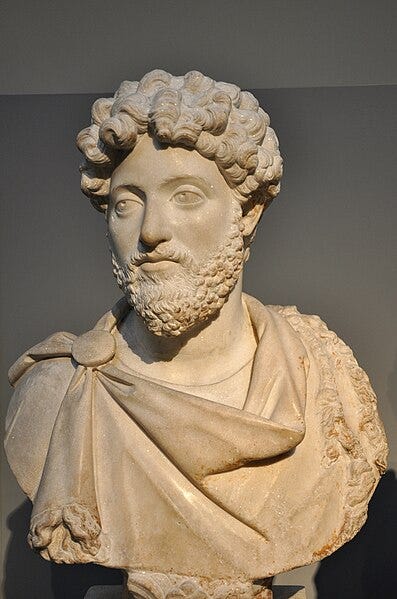Why Are Self-Improvement Gurus So Enthralled by Stoicism?
Written on
Chapter 1: The Stoic Obsession in Self-Improvement
Have you tailored your daily routine around Stoic principles? Are you strictly adhering to its teachings? Are you reading Marcus Aurelius’s Meditations as part of your nightly ritual? If not, you might be missing out on what many consider the ultimate key to achievement and productivity.
“If not, what are you waiting for? Don’t you want to see real progress in your life? Grinding is the only way to succeed!”
It's hard to ignore how prevalent Stoic philosophy has become in the self-improvement community. It seems like everyone has picked up the same playbook, echoing, “Polly wants to be a Stoic!”
I suspect many have overlooked other philosophical frameworks.
This isn't a critique of Stoicism itself, but rather a question of why it overshadows philosophies like Pythagoreanism, Platonic Idealism, or Skepticism—each of which holds its own value. As a philosopher, I’m curious why Stoicism garners such disproportionate admiration in these circles. Let’s delve into three potential reasons for its widespread appeal:
- It aligns seamlessly with the relentless “grind” culture. Work around the clock, pursue your dreams with unyielding fervor, and elevate your family’s lifestyle!
Sure, this perspective is exaggerated, but only slightly.
Stoicism is often viewed as a philosophy for the resilient.
“Don’t be weak! Stand tall! Adversity breeds strength! No pain, no gain!”
Such clichés are rampant.
The emphasis on discipline and resilience.
Stoicism advocates for self-control, clear thinking, and enduring hardship—qualities many aspire to, especially in the business realm. It's no surprise that entrepreneurs often revere it as their guiding doctrine.
However, hard work alone doesn’t guarantee wealth. We all know individuals who have toiled tirelessly yet never achieved financial success. Moreover, trauma from adversity doesn’t automatically transform someone into a paragon of strength; it can either build or break you, influenced by personal beliefs and character.
The Historical Context of Stoicism
To better understand Stoicism, let’s explore its roots. It emerged during a time when Greek culture was beginning to decline, reflecting the societal zeitgeist. The illustrious eras of Solon, Socrates, Plato, Aristotle, and Pericles had waned, leaving behind a sense of decay as the Romans rose to power.
Stoicism developed under these conditions, marked by three key phases of thought:
- Early Stoa (established around 300 BCE by Zeno of Citium and Chrysippus)
- Middle Stoa (2nd & 1st Century BCE)
- Late Stoa (popularized by figures like Seneca, Epictetus, and Marcus Aurelius).

Core Tenets of Stoicism
While we won’t delve too deeply, it’s essential to outline some foundational Stoic principles. Stoicism embraces Empiricism—asserting that we perceive reality through our senses. The belief is that the individual is paramount, eschewing Plato’s abstract Ideas. This viewpoint leans towards materialism, positing that while a divine entity exists, it also possesses a material essence.
Ethics are pivotal, anchored in living harmoniously with nature, which embodies universal Reason (logos). To live virtuously is to exercise wisdom and self-control, which involves mastering our passions—those impulses that disrupt our peace and obscure our rational thought. The Stoic ideal is to accept circumstances as they are, maintaining clarity of mind, unperturbed by fear, desire, or distress.
Additionally, Stoics subscribed to Causal Determinism, suggesting that our lives are shaped by external material factors, implying a lack of freedom. Hence, their ethical stance is to endure—embracing hardship as a Stoic would. This philosophy bears similarities to Zen Buddhism in certain respects.
I personally find determinism problematic. I believe we can reshape our destinies. Even from a material perspective, numerous actions can be taken to alter our circumstances. Furthermore, as conscious beings, we have the capacity to create our reality according to our desires.
The Value of Stoicism
Without a doubt, Stoicism has its merits. Demonstrating strength and resilience in the face of adversity is indicative of a robust character.
“The things that challenge you ultimately make you stronger.”
This saying rings true and can serve as a significant motivator. Moderate stress is essential for growth; without it, we risk stagnation.
However, remember that you have the power to change your reality. If you find dissatisfaction in your life, whether it’s your job, environment, or relationships, take action. You are not a mere fixture in your surroundings! Even in the direst situations—like those faced by Victor Frankl—you can maintain freedom within your mind.
Final Thoughts
It’s time to broaden your philosophical horizons. If you’re genuinely interested in philosophy, don’t limit yourself to Stoicism. Countless other schools of thought await exploration, both in the West and the East. Avoid mindlessly mimicking what’s trendy because it resonates with some influencers. Instead, exercise discernment and strive for originality. Be true to yourself; don’t become a carbon copy of someone else. In the end, that won’t serve you well.
Sources:
Copleston, Frederick — A History of Philosophy, Vol. 1: Greece and Rome, From the Pre-Socratics to Plotinus, New York (1993)
Chapter 2: The Dark Side of Self-Improvement
Exploring the pitfalls of the self-help industry can be eye-opening.
In this video, "Your Self Help Obsession Is Making You Toxic," we discuss the potential dangers of overindulging in self-help ideologies and the impact they can have on mental health.
The second video, "The Toxic World of Self Help: Hustle Culture, Toxic Positivity, Addiction, and Fake Gurus," addresses the darker aspects of self-help culture and its influence on personal development.